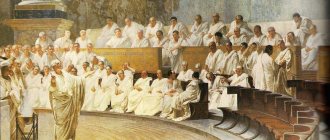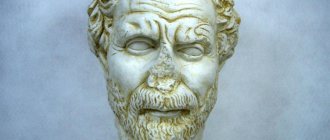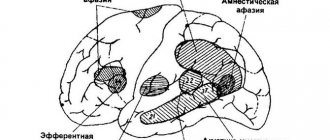In Dahl's dictionary
and. Greek rhetoric, the science of eloquence, eloquence. Rhetor, -rka, teacher of eloquence; an eloquent, eloquent person, an eloquent speaker, an artificially elegant writer. Rhetorical, related to rhetoric and rhetoric. Rhetorical, characteristic of rhetoricians. Rhetorical tropes, figures, artificial decorations of speech, given in the rules. To rhetoric, rhetorically, speak or write eloquently, eloquently, flowerily, skillfully and artificially, diligently imitate elegant writers, and therefore speak pompously and coldly. Rhetorism, rhetoric, action according to the verb. There is no soul in his speeches, it is just rote rhetoric. Rhetorical, in which there is a lot of rhetoric. Rhetoric, yes cloying.
The meaning of the word rhetoric
In poetics (Yu. Lotman's concept), the term rhetoric is used in a linguistic sense as the rules for constructing speech; in semantics – as “rhetoric of figures”; and also as the “poetics of text,” meta-rhetoric is defined as “the theory of creative thinking.”
The word rhetoric currently means both what the ancient Greeks already called and what Aristotle wrote his “Rhetoric” about, and what some representatives of the movement, sometimes called post-structural, call in the same way, non-traditional rhetoric is twenty-five centuries older than the new one and has, therefore, earned the right to my name, which means I have the right not to explain why I use this and not other research equipment.
Lomonosov's rhetoric was also a great merit for its time; if it is now forgotten, it is not because we have rhetoric higher in dignity than it, but because now rhetoric, in the meaning given to it as a science that teaches one to write well, has become the exclusive property of pedants, fools and is considered such the same science as alchemy and astrology.
Koshansky: “General rhetoric contains the initial, main, general rules of all prose writings. “Private rhetoric, based on the general rules, examines each prose composition separately, showing its content, convenient location, main advantages and disadvantages, purpose.”[47, 8]
Thus, educational (didactic) rhetoric plays an important role, like scientific rhetoric, in the system of rhetorical disciplines, i.e.
But don’t fool yourself into thinking that the exit rhetoric is more than just rhetoric.
General rhetoric studies the principles of constructing speech in any field of activity, and private rhetoric involves the use of these general principles in certain communication, in preparation for specific speeches (protocol and etiquette, entertaining, informational, persuasive).
According to Aristotle, rhetoric studies the system of evidence used in speech, its syllable and composition: rhetoric is thought of by Aristotle as a science closely related to dialectics (i.e.
As a result of this, rhetoric takes on the appearance of politics, and people who consider rhetoric their property pass themselves off as politicians, whether due to ignorance, or charlatanism, or due to other reasons inherent in human nature.
In the Encyclopedia Dictionary
(Greek rhetorike), 1) the science of oratory and, more broadly, of artistic prose in general. It consisted of 5 parts: finding material, arrangement, verbal expression (the teaching of 3 styles: high, medium and low and 3 means of elevating style: selection of words, combination of words and stylistic figures), memorization and pronunciation. Rhetoric was developed in antiquity (Cicero, Quintilian), developed in the Middle Ages and in modern times (in Russia M.V. Lomonosov). In the 19th century the doctrine of verbal expression merged into poetics and became part of the theory of literature under the name of stylistics. All R. 20th century the broad (general literary, linguistic and even philosophical) significance of tereffective speech communication is being revived. 2) Musical rhetoric is a musical theoretical doctrine of the Baroque era, associated with the view of music as a direct analogy of oratorical and poetic speech. Included the same parts as literary rhetoric; their content was expressed in a system of specific musical techniques (see Art. Figure).
Rhetoric is...
The word “rhetoric” has ancient roots. It was first used in Ancient Greece. Literally, the lexeme ῥητωρική is translated as “ oratory ”. In turn, it goes back to the word ῥήτωρ - “orator”.
It is important to understand that in modern terminology such concepts as rhetoric and oratory are not equal, although initially they really meant the same thing. Rhetorical science, as it developed, incorporated the theory of prose and argumentation.
So, at the moment the following definition :
Rhetoric is a science that studies the art of speech, the laws of generation, transmission and perception of statements.
Unlike other disciplines, which in a broad sense go back to philology, rhetorical teaching carries within itself other values. It is primarily aimed at solving applied problems .
In ancient times (including in Russia), this discipline implied not only language proficiency , but also the use of this proficiency for good purposes - to lead to good, to guide people on the path of the true.
The Russians used native vocabulary to denote this science - the words red-speaking, good-language, good-speaking...
Speaking skills: Who needs it?
Despite the fact that we devote less and less time to personal communication, and we trust gadgets more and more, we can name many situations when eloquence skills are necessary.
The simplest example: you need to give a presentation to business partners. Yes, of course, sometimes no presentations are required and when concluding deals you can get by with an email. But you can probably remember a couple of situations when, for example, the need to publicly talk about your company or products caused an acute attack of panic among employees - for the simple reason that they were not confident in their rhetorical skills. Or when an insecure, boring, sluggish presentation by a company representative discouraged potential clients from doing business with her...
“Speech should flow and develop from knowledge of the subject. If the speaker has not studied it, then all eloquence is a vain, childish effort" (Cicero)
Surely, if you remember your student years, you will be able to name the names of teachers whose lectures you listened to with enthusiasm, and even notorious lazy ones. Simply because the professor or associate professor brilliantly mastered the art of words, “saw” the audience, and knew how to contact it (yes, this is a necessary skill, and we will definitely talk about it too!). And, unfortunately, they remain in the memory of many of us. no, not lectures, but memories of how during these lectures we painfully tried not to fall asleep and remember at least something. And at this time the lecturer, with his eyes downcast, muttered indistinctly, moved from the fifth to the tenth and with all his appearance expressed disgust at what was happening. Yes, many educational institutions already have video recordings of lectures in their arsenal, and it is not always necessary to attend a “live” lesson. But audio or video lectures can also be both successful and not so successful.
Guy Julius Caesar in his youth studied the art of eloquence, but, according to the testimony of many ancient historians, he did not complete the course of study. He decided that where he lacked rhetorical abilities, his legions would say everything for him. However, the literary heritage of the Roman ruler suggests that he was undoubtedly a talented speaker and writer
Perhaps you have come up with another argument: “But many have graduated long ago and, for example, are working remotely! Thanks to modern technologies, you can provide for yourself without leaving home at all! Why should I care about eloquence and the ability to properly structure the communication process?” Yes, but not so. Remember how many times you were indignant, for example, at the tongue-tied instructions for household appliances, how many times you couldn’t decide on a summer vacation destination because of a clumsily drawn up tour description, how many times you couldn’t get clear and logical instructions from your manager... But all this has a direct impact attitude to the art of rhetoric! After all, even if the text is not intended to be spoken publicly, no one has canceled the need to compose it competently and logically.
And in ordinary everyday communication, a person who can express his thoughts beautifully, captivatingly and clearly is much more pleasant than a gloomy type who is unable to connect two words. (We will still proceed from the fact that we do not spend our entire lives within four walls and from time to time “go out into the world.”) Even the ancient Greek sage Aristotle (by the way, who did a lot for the development of ancient rhetoric) said: “Man... is social animal." As long as human society exists on Earth, we will need communication skills. Honestly, this law has been true since the time of Aristotle!
Well, did we manage to convince you?
A matter of national importance
Peter I demanded from those close to him not only precision and clarity of reports, but also mastery of the subject. Just look at his decree of 1703: “I instruct the senators at assemblies and in the presence of gentlemen to speak only in words, and not in writing, so that everyone’s stupidity is visible to everyone!”
More, even more information!
Of course, neither today nor five hundred years ago everyone was destined to become a commander or statesman. But the role of eloquence in the past was significantly higher than it is now. Why? It’s very simple: we, people of the 21st century, are fed up with information. We watch films, listen to news on the radio, read feeds from information sites. Every minute, gigabytes of photographs, articles, messages, and music tracks are dumped on us. Many of us encounter verbal communication only at a school desk or in a university lecture hall. In short, we can obtain a huge amount of information without resorting to face-to-face communication. At the same time, the quality of the text itself fades into the background - in many cases the text is replaced by a video, photograph, or infographic.
And a resident of a medieval city or Greek polis sometimes had no other opportunity to find out the latest news than to listen to an orator or herald. This man had no photographs or videos at his disposal; he could only rely on his eloquence. Let us remember that there were few literate people then, so even written sources of information could not always fully fulfill their functions.
“By reading authors who write well, you learn to speak well” (Voltaire)
Lawyers, teachers, religious figures, politicians learned to speak correctly and convincingly... By the way, it was in the political struggle that the ability to defend one’s point of view and attract like-minded people never lost relevance: for example, many researchers are convinced that during the Civil War in Russia, victory remained with “ “red”, not least thanks to competent, very visual and superbly organized campaigning.
“But excuse me,” you can say, “now is no longer the Middle Ages and, fortunately, not the times of the Civil War! Moreover, many politicians and public figures have long preferred not to speak from the podium, but to use the capabilities of the World Wide Web for propaganda!” This is partly true. But…
The connection between rhetoric and other sciences
Rhetoric is close to many scientific disciplines in the humanities. But to say that even one teaching can absorb it would be unfair.
It is rather located at the junction , at the multi-level intersection of sciences, absorbing everything that it can use for its own purposes - to speak and convince.
Let's take a closer look at these connections:
- Philosophy. Relations with this science are always the most complex, because philosophers will say that their discipline absorbs all the others.
In any case, the connection is close. Thanks to the mastery of rhetorical “kung fu”, a person is able to develop the systematic nature of his thinking and “define” it. This is a sign of a holistic vision of the world around us. - Ethics . The closest connection, because the object of both disciplines is morality and its laws. At the same time, ethics is focused on the behavior of the subject as such, while rhetoric is focused on speech behavior and its consequences.
- Logic . Rhetoric speaks of verbal thinking; it is based on laws (including logical ones) that ensure the effectiveness of statements. Logic considers thinking as a whole. The key difference is that logic is aimed at finding evidence, and rhetoric is aimed at finding an argument (how is that?).
- Psychology. Dual use relationships. On the one hand, rhetoric uses human psychology as such to embody verbal thinking.
On the other hand, the rhetorician also applies his knowledge of this science in order to influence the sensory-emotional, psychological side of the recipient. - Linguistics . Linguists are actively trying to appropriate the science of rhetoric. Moreover, it is attributed to different areas of linguistics - speech culture, stylistics, pragmatics and text linguistics (how is that?). There is a reason for such an “annexation” (how is that?), because we are talking about speech – the main object of linguistics. However, it cannot be said that rhetoric can be completely absorbed by this great science.







